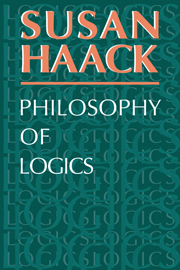Book contents
- Frontmatter
- ACKNOWLEDGMENTS
- Contents
- Preface
- Notation and abbreviation
- 1 ‘Philosophy of logics’
- 2 Validity
- 3 Sentence connectives
- 4 Quantifiers
- 5 Singular terms
- 6 Sentences, statements, propositions
- 7 Theories of truth
- 8 Paradoxes
- 9 Logic and logics
- 10 Modal logic
- 11 Many-valued logic
- 12 Some metaphysical and epistemological questions about logic
- Glossary
- Advice on reading
- Bibliography
- Index
2 - Validity
Published online by Cambridge University Press: 05 June 2012
- Frontmatter
- ACKNOWLEDGMENTS
- Contents
- Preface
- Notation and abbreviation
- 1 ‘Philosophy of logics’
- 2 Validity
- 3 Sentence connectives
- 4 Quantifiers
- 5 Singular terms
- 6 Sentences, statements, propositions
- 7 Theories of truth
- 8 Paradoxes
- 9 Logic and logics
- 10 Modal logic
- 11 Many-valued logic
- 12 Some metaphysical and epistemological questions about logic
- Glossary
- Advice on reading
- Bibliography
- Index
Summary
Assessing arguments
Arguments are assessed in a great many ways; some, for instance, are judged to be more persuasive or convincing than others, some to be more interesting or fruitful than others, and so forth. The kinds of assessment that can be made can be classified, in a rough and ready way, like this:
(i) logical: is there a connection of the appropriate sort between the premises and the conclusion?
(ii) material: are the premises and conclusion true?
(iii) rhetorical: is the argument persuasive, appealing, interesting to the audience?
I have given only the vaguest indication of the kinds of question characteristic of each dimension of assessment, but a rough indication should be adequate for present purposes. The separate category given to rhetorical considerations is not intended to suggest that the validity of an argument, or the truth of its premises, is quite irrelevant to its persuasiveness; it is intended, rather, to allow for the fact that, though if people were completely rational they would be persuaded only by valid arguments with true premises, in fact often enough they are persuaded by invalid arguments or arguments with false premises, and not persuaded by sound (cf. p. 14 below) arguments (see e.g. Thouless 1930, Stebbing 1939, Flew 1975, Geach 1976 for discussion of, and advice on how to avoid, such failures of rationality).
In what follows I shall be almost exclusively concerned with the first, logical, dimension of assessment.
- Type
- Chapter
- Information
- Philosophy of Logics , pp. 11 - 27Publisher: Cambridge University PressPrint publication year: 1978



